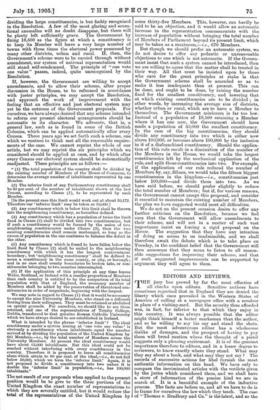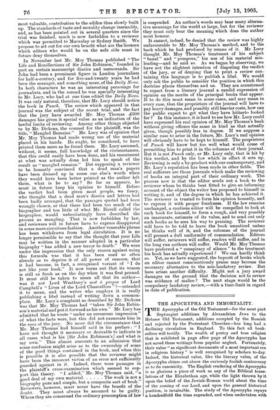T HE jury has proved by far the most effective of
all checks upon editors. Sensitive authors have sometimes regretted that in England they are denied the liberty which once prevailed in the Western States of America of calling at a newspaper office with a revolver in place of a visiting-card. But the security thus afforded was, in fact, far inferior to that which they enjoy in this country. It was always possible that the editor might think himself a better marksman than the author, and so be willing to say his say and stand the shots. But the most adventurous editor has a wholesome dislike of damages, and the prospect of having to pay them will breed caution where the thought of a pistol suggests only a pleasing excitement. It is of the greatest importance therefore to editors, and in a lesser degree to reviewers, to know exactly where they stand. What may they say about a book, and what may they not say ? The records of successive actions for libel furnish the most authentic information on this head. We have only to compare the incriminated articles with the verdicts given by the juries which considered them, and we shall have a store of information of the precise kind we are in search of. It is a beautiful example of the inductive process. The facts are before us, and all we have to do is to frame for ourselves the law which they teach. The case of " Thomas v. Bradbury and Co." is the latest, and so the most valuable, contribution to the edifice thus slowly built up. The standards of taste and morality change insensibly, and, as has been pointed out in several quarters since the trial was finished, much is now forbidden to a reviewer which was permitted to Macaulay or Sydney Smith. We propose to set out for our own benefit what are the licenses which editors who would be on the safe side must in future deny themselves.
In November last Mr. Moy Thomas published "The Life and Recollections of Sir John Robinson," founded in part on certain manuscript diaries and memoranda. Sir John had been a prominent figure in London journalism for half-a-century, and for five-and-twenty years he had been the manager, and something more, of the Daily News.
In both characters he was an interesting personage for journalists, and in the second he was specially interesting to Mr. Lucy, who had at one time edited the Daily News.
It was only natural, therefore, that Mr. Lucy should notice the book in Punch. The review which appeared in that journal was the subject of the recent trial, and the fact that the jury have awarded Mr. Moy Thomas £300 damages has given it special value as an indication of the lawful limits of reviewing. Among other things objected to by Mr. Dickens, the counsel for the plaintiff, was the title, "Mangled Remains." Mr. Lucy was of opinion that Mr. Moy Thomas had made wrong use of the material placed in his hands. He ought, he considered, to have printed them more as he found them. Mr. Lucy assumed, without, it seems, full knowledge of the circumstances, that this could easily have been done, and his resentment at what was actually done led him to speak of the result as "mangled remains." But supposing a reviewer to be honestly convinced that a dead man's papers have been dressed up in some one else's words when they would have been better printed as the author left them, what is he to say ? So far as appears, he • must in future keep his opinion to himself. Before the verdict had been given most people, we fancy, who thought that a dead man's diaries and letters had been badly arranged, that the passages quoted had been wrongly chosen, or that there had been too much of the biographer and too little of what Mr. Birrell called the biographee. would unhesitatingly have described the process as mangling. That is now forbidden by law, and reviewers will in future have to express disapproval in some more circuitous fashion. Another venerable phrase has been withdrawn from legal circulation. It is no longer permissible to say that the thought that your Life may be written in the manner adopted in a particular biography "has added a new terror to death." We were under the impression that the only reason against using this formula was that it has been used so often already as to deprive it of all power of censure, that it had become, in fact, a recognised variant of "I do not like your book." It now turns out that its venom is still as fresh as on the day when it was first penned.
It must still be taken to mean all that its author— was it not Lord Westbury's mot a propos of Lord Campbell's "Lives of the Lord Chancellors "?—intended it to mean, and the writer who employs it is really publishing a libel instead of writing down a common- place. Mr. Lucy's complaint as described by Mr. Dickens was that Mr. Moy Thomas had "taken Sir John Robin- son's material and put it forward as his own." Mr. Lucy has admitted that he wrote "under an erroneous impression" of what the facts were, but this did not exonerate him in the eyes of the jury. No more did the circumstance that Mr. Moy Thomas had himself said in his preface : "I have not thought it necessary or desirable to indicate in all cases what is his [Sir John Robinson's] and what is my own." This almost amounts to an admission that some confusion might arise as to the ownership of some of the good things contained in the book, and when this is possible it is also possible that the reviewer might have been the innocent victim of an error not sufficiently guarded against in it. Indeed, there were passages in the plaintiff's cross-examination which seemed to sup- port this theory. "I added," Mr. Moy Thomas said, "a good deal of my own material The work is not a biography pure and simple, but a composite sort of book." Reviewers, however, must never have the benefit of the doubt. They must always be assumed to be guilty. Where they are concerned the ordinary presumption of law is suspended. An author's words may bear many alterna- tive meanings for the world at large, but for the reviewer they must only bear the meaning which does the author most honour.
It cannot, indeed, be denied that the review was highly unfavourable to Mr. Moy Thomas's method, and to the book which he had produced by means of it. Mr. Lucy thought Mr. Moy Thomas's treatment of his subject " banal " and "pompous," his use of his material mis- leading—and. he said so. As we began by observing, we have not the slightest intention of disputing the verdict of the jury, or of denying that to print a review con- taining this language is to publish a libel. We would only ask the public to consider the position in which this doctrine places themselves and us. They are accustomed to expect from a literary journal a candid expression of opinion on the merits of the principal books that appear. If to do this must mean in some cases, and may mean in every case, that the proprietors of the journal will have to pay heavy damages, and possibly still heavier costs, how can the public expect to get what they have, hitherto looked for ? In this instance, it is hard to see how Mr. Lucy could have expressed his real opinion of Mr. Moy. Thomas's book without giving offence the same in kind as that actually given, though possibly less in degree. If we suppose a similar case to arise in the future, Mr. Lucy's real opinion will obviously have to be kept to himself. The proprietors of Punch will know but too well what would come of permitting him to print it in the columns of their journal. But it is not Punch only, or Mr. Lucy only, that is hit by this verdict, and by the law which in effect it sets up. Reviewing is only a by-product with our contemporary, and Mr. Lucy's reputation has been made in other fields. The real sufferers are those journals which make the reviewing of books an integral part of their ordinary work. The process now is that the editor sends out a book to the reviewer whom he thinks best fitted to give an informing account of the object the writer has proposed to himself in writing it, and of the degree in which he has achieved it. The reviewer is trusted to form his opinion honestly, and to express it with proper frankness. If the law remains unchanged, a cautious editor will be compelled to look at each book for himself, to form a rough, and very possibly an inaccurate, estimate of its value, and. to send out only such books as he sees his way to praising. The reviewer will have to be told to leave the book unnoticed unless he thinks well of it, and the columns of the journal will present a dull uniformity of commendation. Editors will suffer, reviewers will suffer, readers will suffer, and in the long run authors will suffer. Would Mr. Moy Thomas have preferred a" conspiracy of silence" to the treatment his book has actually experienced ? We can hardly think so. Yet, as we have suggested, the boycott of books which an editor cannot conscientiously praise may become the necessary alternative to the non-laudatory review. But here arises another difficulty. Might not a jury award damages on the ground that the decision not to review was evidence of malice ? The next stage would be the compulsory laudatory review,—with a time-limit in regard to date of publication.







































 Previous page
Previous page